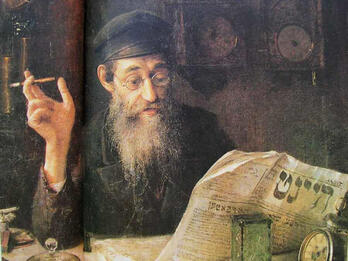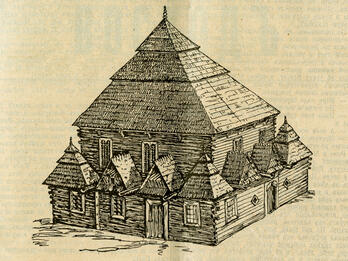On Prayer
Marcel Mauss
1909
Chapter 1. General Introduction
Of all religious phenomena, there are few which, even when considered merely from the outside, give such an immediate impression of life, richness and complexity as does the phenomenon of prayer. Prayer has a marvellous history. Coming from the depths, it has gradually raised itself to the heights of religious life…

Related Guide
Jewish Intellectual Inquiry at the Turn of the Twentieth Century
Jewish scholars combined empirical social science with philosophical inquiry, while others explored Jewish history, folklore, and identity to address the challenges of modernity and antisemitism.
Creator Bio
Marcel Mauss
Born in Épinal, France, the influential sociologist and anthropologist Marcel Mauss studied at the University of Bordeaux and in 1901 was appointed professor of “histoire des religions des peoples non civilisés” at the École Pratique des Hautes Études, Paris. He collaborated with his uncle, the founding figure of French sociology, Émile Durkheim, on various projects, including the journal L’Année sociologique, later becoming its editor. In 1925 Mauss cofounded the Ethnology Institute at the University of Paris. An innovative teacher and writer, his ideas influenced many sociologists and anthropologists, among them Claude Lévi-Strauss. Mauss’s scholarly work focused on the ethnology and social structures of nonliterate societies (such as those in Polynesia, Melanesia, and northwestern North America). His analysis of the forms of exchange and transaction that characterized those societies yielded his lasting work, his 1923 Essai sur le Don (translated into English as The Gift). he also wrote works concerning magic, mourning rites, and other topics. Mauss was involved in public affairs, supporting Alfred Dreyfus in his battle to prove his innocence and helping to establish a socialist daily newspaper entitled L’Humanité. He suffered a mental breakdown due to his experiences under the German occupation of France yet survived the war and went on to publish two further works.
You may also like
Legends of the Jews
Orpheus: A History of Religions
Report Addressed to the Members of the JCA Council
Problems with Immigration
Russian engineer Aaron Pavlovsky was invited to Argentina to found its first agricultural school in 1883. In this speech, he insists that the country’s economic future depends upon immigration.

Old Wooden Synagogues in Polish Lithuania



